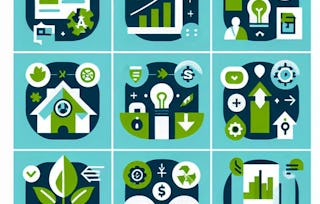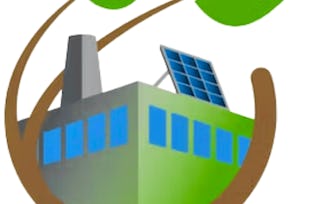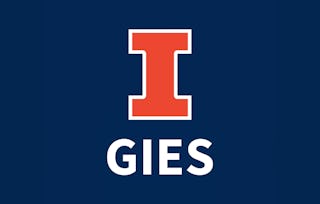The Business School at the University of Colorado Denver wants to help you become a change agent for sustainable business. We hope that with the skills and concepts you gain from this specialization that you will help your business reduce its social and environmental impact. Being a change agent is hard. It takes courage and passion and knowledge. To implement change also requires being able to make the case for that change in terms that people in your company or organization respond to and understand.

Ends soon: Gain next-level skills with Coursera Plus for $199 (regularly $399). Save now.

First Steps in Making the Business Case for Sustainability
This course is part of Become a Sustainable Business Change Agent Specialization

Instructor: John Byrd
16,763 already enrolled
Included with
(215 reviews)
Skills you'll gain
Details to know

Add to your LinkedIn profile
See how employees at top companies are mastering in-demand skills

Build your subject-matter expertise
- Learn new concepts from industry experts
- Gain a foundational understanding of a subject or tool
- Develop job-relevant skills with hands-on projects
- Earn a shareable career certificate

There are 5 modules in this course
Welcome to the first class of Become a Sustainable Business Change Agent. This week we introduce you to several people who are making changes and talk about the class and the entire specialization. We also begin to think about what type of changes you should look for at the start of your change agent career. Finally, we discuss what a good proposal has to do to be approved. The proposal has to convince decision-makers that your change helps the company or organization. So you need to make sure that the right people support your idea, that the right person receives it and that you have made a sound case for the sustainability change you are proposing. During the next classes we will help you learn the tools to put together a powerful proposal and to identify the key people who will influence your idea being implemented. We hope by the end of this specialization you will have a proposal for a change in your company, or have the tools so when that opportunity arises you can be an agent of positive change.
What's included
5 videos1 reading1 assignment2 discussion prompts
This week we discuss what you should be trying to accomplish with your first sustainability change project and give you some ideas of the types of projects that are likely to be successful. We also introduce the notion of establishing a baseline so you can measure the effect of your change.
What's included
7 videos1 assignment1 peer review1 discussion prompt
An important aspect of making the business case of change is to show the likely financial impact of the change. Ideally, we will find improvements that increase profits either by saving the company money or by increasing sales. To demonstrate these financial benefits we use a standard tool from financial analysis - Net Present Value analysis (NPV). The idea underlying Net Present Value analysis is that we estimate all the cash inflows and outlays associated with a project, then through a technique called discounting (or computing the present value) we shift all the cash flows into the present so they can be compared. You cannot compare an outlay made to day directly to a cash flow or profit to be received in two or three years. Combining the present value of the cash flows - adding the present value of benefits and subtracting the present value of outlays - gives us the Net Present Value. If the NPV is positive the benefits, adjusted for time, more than offset the costs and the project enhances the value of the company. If the NPV is negative then the monetary benefits do not more than offset the costs. But there may be non-monetary reasons for pursuing the project. This is where we begin to consider the reasons for companies becoming sustainable discussed in Week 2 of this module. The business case includes the financial impact and non-monetary sustainability impacts of the change.
What's included
4 videos2 readings1 assignment1 peer review1 discussion prompt
In this module we cover two topics: The benefits for companies of being sustainable and aspects of our economic system that prevent/discourage companies form being more sustainable. The goal of the module is to give you the first tools for making the business case for sustainability. The benefits of sustainability will be important as you put together your proposal for change. If you work in the sustainable business arena very long you will need to know some of the vocabulary and economics that cause some of our environmental and social problems. These are market failures. We'll introduce three: externalities, common access resource problems and information failures.
What's included
4 videos3 readings1 assignment1 peer review2 discussion prompts
The Business School at the University of Colorado Denver wants to help you become a change agent for sustainable business. We hope that with the skills and concepts you gain from this specialization that you will help your business reduce its social and environmental impact. Being a change agent is hard. It takes courage and passion and knowledge. To implement change also requires being able to make the case for that change in terms that people in your company or organization respond to and understand. We begin our journey to being a change agent by introducing sustainability thinking. Sustainable business requires a new way of seeing and thinking about how business operates. By beginning to think sustainably you will be better able to identify ways that your company can improve and explain those changes to decision makers. We will look at 6 ways of thinking related to sustainability: • Life-Cycle Thinking • Long-Term Thinking • Circular Thinking • Resilience Thinking • Systems Thinking • Context Thinking
What's included
8 videos1 reading1 assignment2 peer reviews1 discussion prompt
Earn a career certificate
Add this credential to your LinkedIn profile, resume, or CV. Share it on social media and in your performance review.
Instructor

Offered by
Explore more from Leadership and Management
 Status: Free Trial
Status: Free TrialUniversity of Colorado Boulder
 Status: Free Trial
Status: Free TrialUniversity of Colorado System
 Status: Free Trial
Status: Free TrialUniversity of Colorado Boulder

University of Illinois Urbana-Champaign
Why people choose Coursera for their career




Learner reviews
215 reviews
- 5 stars
75.34%
- 4 stars
19.53%
- 3 stars
2.79%
- 2 stars
0.93%
- 1 star
1.39%
Showing 3 of 215
Reviewed on Apr 2, 2021
The course content I did take was good, practical content. The quizzes did not display properly on my computer so were frustrating to take.
Reviewed on Feb 13, 2021
Good course content. Good beginner course on management skills and decision making for sustainability and management practices
Reviewed on Jul 25, 2021
I loved this course. A lot of practical guidance to implement sustainable change in the organisation.
Frequently asked questions
To access the course materials, assignments and to earn a Certificate, you will need to purchase the Certificate experience when you enroll in a course. You can try a Free Trial instead, or apply for Financial Aid. The course may offer 'Full Course, No Certificate' instead. This option lets you see all course materials, submit required assessments, and get a final grade. This also means that you will not be able to purchase a Certificate experience.
When you enroll in the course, you get access to all of the courses in the Specialization, and you earn a certificate when you complete the work. Your electronic Certificate will be added to your Accomplishments page - from there, you can print your Certificate or add it to your LinkedIn profile.
Yes. In select learning programs, you can apply for financial aid or a scholarship if you can’t afford the enrollment fee. If fin aid or scholarship is available for your learning program selection, you’ll find a link to apply on the description page.
More questions
Financial aid available,
¹ Some assignments in this course are AI-graded. For these assignments, your data will be used in accordance with Coursera's Privacy Notice.





